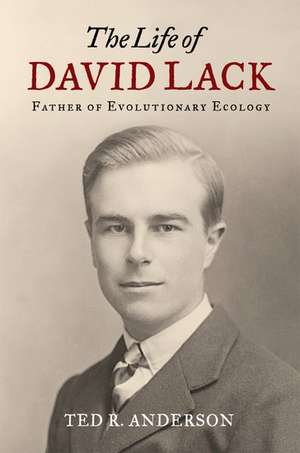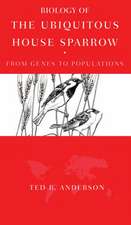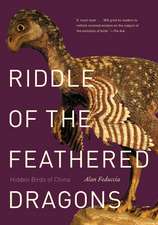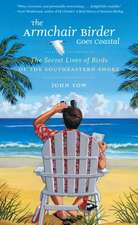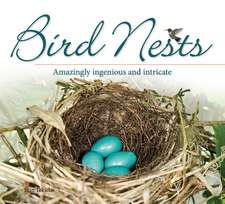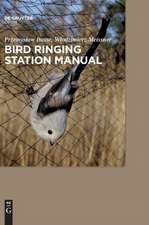The Life of David Lack: Father of Evolutionary Ecology
Autor Ted Andersonen Limba Engleză Hardback – 18 iul 2013
Preț: 490.32 lei
Preț vechi: 679.85 lei
-28% Nou
Puncte Express: 735
Preț estimativ în valută:
93.84€ • 97.47$ • 77.95£
93.84€ • 97.47$ • 77.95£
Carte tipărită la comandă
Livrare economică 21-27 ianuarie 25
Preluare comenzi: 021 569.72.76
Specificații
ISBN-13: 9780199922642
ISBN-10: 0199922640
Pagini: 256
Ilustrații: 19 black-and-white
Dimensiuni: 163 x 236 x 23 mm
Greutate: 0.46 kg
Editura: Oxford University Press
Colecția OUP USA
Locul publicării:New York, United States
ISBN-10: 0199922640
Pagini: 256
Ilustrații: 19 black-and-white
Dimensiuni: 163 x 236 x 23 mm
Greutate: 0.46 kg
Editura: Oxford University Press
Colecția OUP USA
Locul publicării:New York, United States
Recenzii
An excellent and fascinating account of the life and work of perhaps the most influential ornithologist and evolutionist of the 20th century
this book is readable and will be consistently interesting as history of science, as history of British academic culture and, to a lesser extent, as philosophy of science. Anderson has made a very helpful contribution and has opened a further research agenda for those willing to follow the lead.
As Ted Anderson shows in his charming and very readable biography, Lack's argument, which developed slowly, was that differences in the way populations adapt to and compete for local resources (such as seeds, in the case of finches) is a key part of the process of speciation...Anderson gives us a vivid portrait of Lack and the personalities and careers of many people he interacted with.
At its best, the book provides intimate glimpses into Lack's character and personality. ... Evolutionary ecologists may ... find this to be an accessible introduction to the diverse origins of their field, an area of increasing interest among historians and philosophers of the life sciences.
Overall, this is a most splendid addition to our understanding of an important 20th-century scientist and how his scientific work fundamentally shaped our understanding of ecology, evolution, and behavior in the second half of the 20th-century. It will prove useful to anyone interested in the history of 20th-century biology and especially to those of us wishing a fuller picture of the history of ecology and evolutionary biology as well as the origins of avian biology.
Anderson has done an excellent job of collecting information on David Lack's life, and the short book is packed with interesting detail. The Life of David Lack is a welcome addition to the literature on the history of evolution, and it will be of interest to all of those who teach about evolution in their classes.
[A] sensitive and very readable appreciation of a great scientist.
This book was a delight to read, and is warmly recommended to anyone interested in the life story of one of Britain's greatest ornithologists and his central role in the development of field ornithology in Britain during the middle of the twentieth century.
[I]t was Lack's books that really made him so successful... This biolography is a particularly useful introduction to each of those books and is a treasure trove of information about the life of the man who wrote them.
The book can be fully recommended not only for professionals working in the field of evolutionary ecology, but also to a general audience.
this book is readable and will be consistently interesting as history of science, as history of British academic culture and, to a lesser extent, as philosophy of science. Anderson has made a very helpful contribution and has opened a further research agenda for those willing to follow the lead.
As Ted Anderson shows in his charming and very readable biography, Lack's argument, which developed slowly, was that differences in the way populations adapt to and compete for local resources (such as seeds, in the case of finches) is a key part of the process of speciation...Anderson gives us a vivid portrait of Lack and the personalities and careers of many people he interacted with.
At its best, the book provides intimate glimpses into Lack's character and personality. ... Evolutionary ecologists may ... find this to be an accessible introduction to the diverse origins of their field, an area of increasing interest among historians and philosophers of the life sciences.
Overall, this is a most splendid addition to our understanding of an important 20th-century scientist and how his scientific work fundamentally shaped our understanding of ecology, evolution, and behavior in the second half of the 20th-century. It will prove useful to anyone interested in the history of 20th-century biology and especially to those of us wishing a fuller picture of the history of ecology and evolutionary biology as well as the origins of avian biology.
Anderson has done an excellent job of collecting information on David Lack's life, and the short book is packed with interesting detail. The Life of David Lack is a welcome addition to the literature on the history of evolution, and it will be of interest to all of those who teach about evolution in their classes.
[A] sensitive and very readable appreciation of a great scientist.
This book was a delight to read, and is warmly recommended to anyone interested in the life story of one of Britain's greatest ornithologists and his central role in the development of field ornithology in Britain during the middle of the twentieth century.
[I]t was Lack's books that really made him so successful... This biolography is a particularly useful introduction to each of those books and is a treasure trove of information about the life of the man who wrote them.
The book can be fully recommended not only for professionals working in the field of evolutionary ecology, but also to a general audience.
Notă biografică
Ted R. Anderson is Emeritus Profess or Biology at McKendree University. Professor Anderson is the author of Biology of the Ubiquitous House Sparrow: From Genes to Populations (OUP 2006). He is retired and lives with his wife, Carol, in Kingston, Washington.
